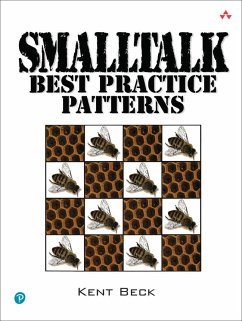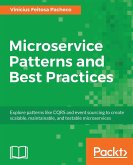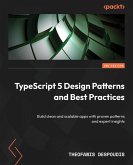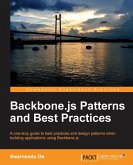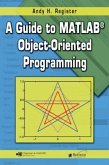Kent Beck
SmallTalk Best Practice Patterns
Kent Beck
SmallTalk Best Practice Patterns
- Broschiertes Buch
- Merkliste
- Auf die Merkliste
- Bewerten Bewerten
- Teilen
- Produkt teilen
- Produkterinnerung
- Produkterinnerung
Smalltalk programmers, project managers, teachers and students -- both new and experienced. This book presents a set of patterns that organize all the informal experience successful Smalltalk programmers have learned the hard way. Understand these patterns, and you can write much more effective code.
Andere Kunden interessierten sich auch für
![Microservice Patterns and Best Practices Microservice Patterns and Best Practices]() Vinicius Feitosa PachecoMicroservice Patterns and Best Practices55,99 €
Vinicius Feitosa PachecoMicroservice Patterns and Best Practices55,99 €![Component-Based Rails Applications Component-Based Rails Applications]() Stephan HagemannComponent-Based Rails Applications48,99 €
Stephan HagemannComponent-Based Rails Applications48,99 €![TypeScript 5 Design Patterns and Best Practices - Second Edition TypeScript 5 Design Patterns and Best Practices - Second Edition]() Theofanis DespoudisTypeScript 5 Design Patterns and Best Practices - Second Edition47,99 €
Theofanis DespoudisTypeScript 5 Design Patterns and Best Practices - Second Edition47,99 €![Backbone.Js Patterns and Best Practices Backbone.Js Patterns and Best Practices]() Swarnendu deBackbone.Js Patterns and Best Practices47,99 €
Swarnendu deBackbone.Js Patterns and Best Practices47,99 €![Aurelia in Action Aurelia in Action]() Sean HunterAurelia in Action54,99 €
Sean HunterAurelia in Action54,99 €![Generative Analysis Generative Analysis]() Jim ArlowGenerative Analysis69,99 €
Jim ArlowGenerative Analysis69,99 €![A Guide to Matlab(r) Object-Oriented Programming A Guide to Matlab(r) Object-Oriented Programming]() Andy H RegisterA Guide to Matlab(r) Object-Oriented Programming134,99 €
Andy H RegisterA Guide to Matlab(r) Object-Oriented Programming134,99 €-
-
-
Smalltalk programmers, project managers, teachers and students -- both new and experienced. This book presents a set of patterns that organize all the informal experience successful Smalltalk programmers have learned the hard way. Understand these patterns, and you can write much more effective code.
Hinweis: Dieser Artikel kann nur an eine deutsche Lieferadresse ausgeliefert werden.
Hinweis: Dieser Artikel kann nur an eine deutsche Lieferadresse ausgeliefert werden.
Produktdetails
- Produktdetails
- Verlag: Pearson Education
- Seitenzahl: 240
- Erscheinungstermin: 3. Oktober 1996
- Englisch
- Abmessung: 236mm x 178mm x 18mm
- Gewicht: 449g
- ISBN-13: 9780134769042
- ISBN-10: 013476904X
- Artikelnr.: 21892114
- Herstellerkennzeichnung
- Libri GmbH
- Europaallee 1
- 36244 Bad Hersfeld
- gpsr@libri.de
- Verlag: Pearson Education
- Seitenzahl: 240
- Erscheinungstermin: 3. Oktober 1996
- Englisch
- Abmessung: 236mm x 178mm x 18mm
- Gewicht: 449g
- ISBN-13: 9780134769042
- ISBN-10: 013476904X
- Artikelnr.: 21892114
- Herstellerkennzeichnung
- Libri GmbH
- Europaallee 1
- 36244 Bad Hersfeld
- gpsr@libri.de
Kent Beck is the founder and director of Three Rivers Institute (TRI). His career has combined the practice of software development with reflection, innovation, and communication. His contributions to software development include patterns for software, the rediscovery of test-first programming, the xUnit family of developer testing tools, and Extreme Programming. He currently divides his time between writing, programming, and coaching. Beck is the author/co-author of Implementation Patterns, Extreme Programming Explained: Embrace Change 2nd Edition, Contributing to Eclipse, Test-Driven Development: By Example, Planning Extreme Programming, Smalltalk Best Practice Patterns, and the JUnit Pocket Guide. He received his B.S. and M.S. in Computer Science from the University of Oregon.
1. Introduction.
Coding. Talking Programs. Good Software. Style. What's Missing? Book
Organization. Adoption. Learning a Pattern.
2. Patterns.
Why Patterns Work. Role of Patterns. Reading. Development. Review.
Documentation. Clean Up. Format.
3. Behavior.
Methods. Composed Method. Constructor Method. Constructor Parameter Method.
Shortcut Constructor Method. Conversion. Converter Method. Converter
Constructor Method. Query Method. Comparing Method. Reversing Method.
Method Object. Execute Around Method. Debug Printing Method. Method
Comment. Messages. Message. Choosing Message. Decomposing Message.
Intention Revealing Message. Intention Revealing Selector. Dispatched
Interpretation. Double Dispatch. Mediating Protocol. Super. Extending
Super. Modifying Super. Delegation. Simple Delegation. Self Delegation.
Pluggable Behavior. Pluggable Selector. Pluggable Block. Collecting
Parameter.
4. State.
Instance Variables. Common State. Variable State. Explicit Initialization.
Lazy Initialization. Default Value Method. Constant Method. Direct Variable
Access. Indirect Variable Access. Getting Method. Setting Method.
Collection Accessor Method. Enumeration Method. Boolean Property Setting
Method. Role Suggesting Instance Variable Name. Temporary Variables.
Temporary Variable. Collecting Temporary Variable. Caching Temporary
Variable. Explaining Temporary Variable. Reusing Temporary Variable. Role
Suggesting Temporary Variable Name.
5. Collections.
Classes. Collection. OrderedCollection. RunArray. Set. Equality Method.
Hashing Method. Dictionary. SortedCollection. Array. ByteArray. Interval.
Collection Protocol. IsEmpty. Includes:. Concatentation. Enumeration. Do.
Collect. Select/Reject. Detect. Inject:into:. Collection Idioms. Duplicate
Removing Set. Temporarily Sorted Collection. Stack. Queue. Searching
Literal. Lookup Cache. Parsing Stream. Concatenating Stream.
6. Classes.
Simple Superclass Name. Qualified Subclass Name.
7. Formatting.
Inline Message Pattern. Type Suggesting Parameter Name. Indented Control
Flow. Rectangular Block. Guard Clause. Conditional Expression. Simple
Enumeration Parameter. Cascade. Yourself. Interesting Return Value.
8. Development Example.
Problem. Start. Arithmetic. Integration.
Summary.
Appendix A: Quick Reference.
Index.
Coding. Talking Programs. Good Software. Style. What's Missing? Book
Organization. Adoption. Learning a Pattern.
2. Patterns.
Why Patterns Work. Role of Patterns. Reading. Development. Review.
Documentation. Clean Up. Format.
3. Behavior.
Methods. Composed Method. Constructor Method. Constructor Parameter Method.
Shortcut Constructor Method. Conversion. Converter Method. Converter
Constructor Method. Query Method. Comparing Method. Reversing Method.
Method Object. Execute Around Method. Debug Printing Method. Method
Comment. Messages. Message. Choosing Message. Decomposing Message.
Intention Revealing Message. Intention Revealing Selector. Dispatched
Interpretation. Double Dispatch. Mediating Protocol. Super. Extending
Super. Modifying Super. Delegation. Simple Delegation. Self Delegation.
Pluggable Behavior. Pluggable Selector. Pluggable Block. Collecting
Parameter.
4. State.
Instance Variables. Common State. Variable State. Explicit Initialization.
Lazy Initialization. Default Value Method. Constant Method. Direct Variable
Access. Indirect Variable Access. Getting Method. Setting Method.
Collection Accessor Method. Enumeration Method. Boolean Property Setting
Method. Role Suggesting Instance Variable Name. Temporary Variables.
Temporary Variable. Collecting Temporary Variable. Caching Temporary
Variable. Explaining Temporary Variable. Reusing Temporary Variable. Role
Suggesting Temporary Variable Name.
5. Collections.
Classes. Collection. OrderedCollection. RunArray. Set. Equality Method.
Hashing Method. Dictionary. SortedCollection. Array. ByteArray. Interval.
Collection Protocol. IsEmpty. Includes:. Concatentation. Enumeration. Do.
Collect. Select/Reject. Detect. Inject:into:. Collection Idioms. Duplicate
Removing Set. Temporarily Sorted Collection. Stack. Queue. Searching
Literal. Lookup Cache. Parsing Stream. Concatenating Stream.
6. Classes.
Simple Superclass Name. Qualified Subclass Name.
7. Formatting.
Inline Message Pattern. Type Suggesting Parameter Name. Indented Control
Flow. Rectangular Block. Guard Clause. Conditional Expression. Simple
Enumeration Parameter. Cascade. Yourself. Interesting Return Value.
8. Development Example.
Problem. Start. Arithmetic. Integration.
Summary.
Appendix A: Quick Reference.
Index.
1. Introduction.
Coding. Talking Programs. Good Software. Style. What's Missing? Book
Organization. Adoption. Learning a Pattern.
2. Patterns.
Why Patterns Work. Role of Patterns. Reading. Development. Review.
Documentation. Clean Up. Format.
3. Behavior.
Methods. Composed Method. Constructor Method. Constructor Parameter Method.
Shortcut Constructor Method. Conversion. Converter Method. Converter
Constructor Method. Query Method. Comparing Method. Reversing Method.
Method Object. Execute Around Method. Debug Printing Method. Method
Comment. Messages. Message. Choosing Message. Decomposing Message.
Intention Revealing Message. Intention Revealing Selector. Dispatched
Interpretation. Double Dispatch. Mediating Protocol. Super. Extending
Super. Modifying Super. Delegation. Simple Delegation. Self Delegation.
Pluggable Behavior. Pluggable Selector. Pluggable Block. Collecting
Parameter.
4. State.
Instance Variables. Common State. Variable State. Explicit Initialization.
Lazy Initialization. Default Value Method. Constant Method. Direct Variable
Access. Indirect Variable Access. Getting Method. Setting Method.
Collection Accessor Method. Enumeration Method. Boolean Property Setting
Method. Role Suggesting Instance Variable Name. Temporary Variables.
Temporary Variable. Collecting Temporary Variable. Caching Temporary
Variable. Explaining Temporary Variable. Reusing Temporary Variable. Role
Suggesting Temporary Variable Name.
5. Collections.
Classes. Collection. OrderedCollection. RunArray. Set. Equality Method.
Hashing Method. Dictionary. SortedCollection. Array. ByteArray. Interval.
Collection Protocol. IsEmpty. Includes:. Concatentation. Enumeration. Do.
Collect. Select/Reject. Detect. Inject:into:. Collection Idioms. Duplicate
Removing Set. Temporarily Sorted Collection. Stack. Queue. Searching
Literal. Lookup Cache. Parsing Stream. Concatenating Stream.
6. Classes.
Simple Superclass Name. Qualified Subclass Name.
7. Formatting.
Inline Message Pattern. Type Suggesting Parameter Name. Indented Control
Flow. Rectangular Block. Guard Clause. Conditional Expression. Simple
Enumeration Parameter. Cascade. Yourself. Interesting Return Value.
8. Development Example.
Problem. Start. Arithmetic. Integration.
Summary.
Appendix A: Quick Reference.
Index.
Coding. Talking Programs. Good Software. Style. What's Missing? Book
Organization. Adoption. Learning a Pattern.
2. Patterns.
Why Patterns Work. Role of Patterns. Reading. Development. Review.
Documentation. Clean Up. Format.
3. Behavior.
Methods. Composed Method. Constructor Method. Constructor Parameter Method.
Shortcut Constructor Method. Conversion. Converter Method. Converter
Constructor Method. Query Method. Comparing Method. Reversing Method.
Method Object. Execute Around Method. Debug Printing Method. Method
Comment. Messages. Message. Choosing Message. Decomposing Message.
Intention Revealing Message. Intention Revealing Selector. Dispatched
Interpretation. Double Dispatch. Mediating Protocol. Super. Extending
Super. Modifying Super. Delegation. Simple Delegation. Self Delegation.
Pluggable Behavior. Pluggable Selector. Pluggable Block. Collecting
Parameter.
4. State.
Instance Variables. Common State. Variable State. Explicit Initialization.
Lazy Initialization. Default Value Method. Constant Method. Direct Variable
Access. Indirect Variable Access. Getting Method. Setting Method.
Collection Accessor Method. Enumeration Method. Boolean Property Setting
Method. Role Suggesting Instance Variable Name. Temporary Variables.
Temporary Variable. Collecting Temporary Variable. Caching Temporary
Variable. Explaining Temporary Variable. Reusing Temporary Variable. Role
Suggesting Temporary Variable Name.
5. Collections.
Classes. Collection. OrderedCollection. RunArray. Set. Equality Method.
Hashing Method. Dictionary. SortedCollection. Array. ByteArray. Interval.
Collection Protocol. IsEmpty. Includes:. Concatentation. Enumeration. Do.
Collect. Select/Reject. Detect. Inject:into:. Collection Idioms. Duplicate
Removing Set. Temporarily Sorted Collection. Stack. Queue. Searching
Literal. Lookup Cache. Parsing Stream. Concatenating Stream.
6. Classes.
Simple Superclass Name. Qualified Subclass Name.
7. Formatting.
Inline Message Pattern. Type Suggesting Parameter Name. Indented Control
Flow. Rectangular Block. Guard Clause. Conditional Expression. Simple
Enumeration Parameter. Cascade. Yourself. Interesting Return Value.
8. Development Example.
Problem. Start. Arithmetic. Integration.
Summary.
Appendix A: Quick Reference.
Index.

